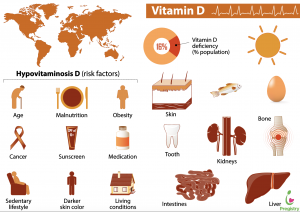You know your developing baby needs nutrients from your diet to grow healthy organs and bones. It’s understandably worrying to hear the phrase “vitamin deficiency” at a prenatal appointment. Insufficient vitamins and minerals can lead to health problems and birth defects, so this is an important way you can make sure you’re providing what your baby needs.
Why Do I Need Vitamin D?
Vitamin D is essential to help your body absorb calcium and promote bone growth. It also contributes to your immune system and other body functions. You get some of your recommended daily allowance from food, but your body can synthesize vitamin D from UVB rays, earning this vitamin the nickname, “the sunshine vitamin.”
The problem is, between long hours working indoors and fear of the harmful effects of too much sun exposure, people can have a hard time getting the sunshine–and vitamin D–their body needs. Vitamin D deficiency is one of the most common vitamin deficiencies. Around half of the U.S. population has low vitamin D levels, including pregnant women.
Low vitamin D in your body can make it harder to build hard, strong bones for your baby. Soft bones can grow into the wrong shape, leading to potential skeletal deformities and rickets. You’re affected, too, since low vitamin D is connected to higher rates of certain pregnancy complications.
How Much Vitamin D Do I Need?
Sources disagree about the optimal vitamin D levels. Your prenatal vitamin probably contains about 400 international units (IU) of vitamin D. Some health organizations recommend 400-600 IU daily. Others say 2,000 IU is a healthier target, and one study found that pregnant women who took 4,000 IU per day in their second and third trimesters had lower rates of gestational diabetes, preeclampsia, and premature labor, without incurring harmful effects.
Vitamin D is a fat-soluble vitamin, which means that if your body takes in too much, you won’t eliminate excess via urination. Fat-soluble vitamins can be harmful if taken in extremely high doses, so it’s important to ask your doctor about the right dosage for you. Because low vitamin D is much more common than too high levels, your doctor may recommend a supplement during pregnancy.
How to Get Vitamin D Safely
You’ve got a few options to bring your vitamin D intake up to recommended levels.
- Get outside. You don’t need to bask in the sun for hours or get a sunburn. Fair-skinned people can improve vitamin D levels with as little as 10 minutes of arm and leg exposure outdoors, especially around midday. Try a lunchtime walk or waiting a little while before applying sunscreen.
- Know when sun isn’t enough. Your melanin levels affect how quickly your body will produce vitamin D. Dark-skinned people will need longer in the sun without sunscreen, but you still need to consider the balance between producing vitamin D or risking prolonged exposure to more harmful UV rays. Your latitude also affects vitamin D production. People living nearer to the equator will get more vitamin D benefits from sunshine. If you’re farther away (in Boston, for example), winter sun may send UVB rays at the wrong angle through the ozone layer for you to be able to synthesize vitamin D effectively.
- Eat vitamin-D rich foods. Salmon, mackerel, beef liver, egg yolks, and fortified foods like milk with vitamin D can help you meet your goal.
- Take a supplement. As we mentioned, your prenatal vitamin may not meet recommended vitamin D levels, so don’t depend on that to cover you. Ask your doctor about taking a vitamin D capsule to resolve a vitamin deficiency and keep your levels healthy.


